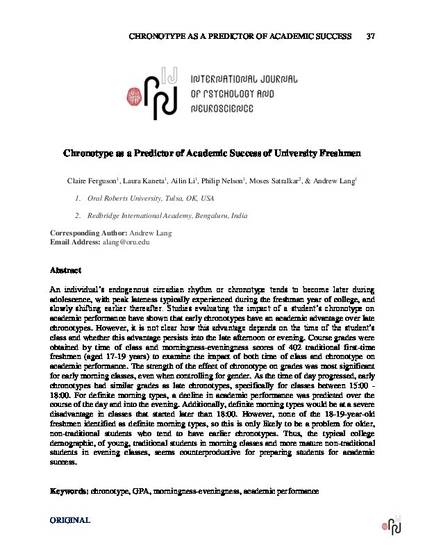
Article
Chronotype as a Predictor of Academic Success of University Freshmen
International Journal of Psychology and Neuroscience
(2018)
Abstract
An individual’s endogenous circadian rhythm or chronotype tends to become later during adolescence, with peak lateness typically experienced during the freshman year of college, and slowly shifting earlier thereafter. Studies evaluating the impact of a student’s chronotype on academic performance have shown that early chronotypes have an academic advantage over late chronotypes. However, it is not clear how this advantage depends on the time of the student’s class and whether this advantage persists into the late afternoon or evening. Course grades were obtained by time of class and morningness-eveningness scores of 402 traditional first-time freshmen (aged 17-19 years) to examine the impact of both time of class and chronotype on academic performance. The strength of the effect of chronotype on grades was most significant for early morning classes, even when controlling for gender. As the time of day progressed, early chronotypes had similar grades as late chronotypes, specifically for classes between 15:00 - 18:00. For definite morning types, a decline in academic performance was predicted over the course of the day and into the evening. Additionally, definite morning types would be at a severe disadvantage in classes that started later than 18:00. However, none of the 18-19-year-old freshmen identified as definite morning types, so this is only likely to be a problem for older, non-traditional students who tend to have earlier chronotypes. Thus, the typical college demographic, of young, traditional students in morning classes and more mature non-traditional students in evening classes, seems counterproductive for preparing students for academic success.
Keywords
- chronotype,
- GPA,
- morningness-eveningness,
- academic performance,
- MEQ
Disciplines
Publication Date
August 31, 2018
Citation Information
Andrew SID Lang, Claire Ferguson, Laura Kaneta, Ailin Li, et al.. "Chronotype as a Predictor of Academic Success of University Freshmen" International Journal of Psychology and Neuroscience Vol. 4 Iss. 2 (2018) p. 37 - 48 ISSN: 2183-5829 Available at: http://works.bepress.com/andrew-sid-lang/33/
Creative Commons license

This work is licensed under a Creative Commons CC_BY International License.
